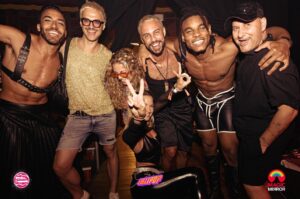As a femme-presenting bisexual woman, I’m not often on the receiving end of much hate and discrimination but I still struggle to find a place where I belong.
But, The Magic Mirror at Sziget Festival made me feel like I was the puzzle piece that they were missing.
The Magic Mirror is the LGBTQIA+ venue at Sziget that has a strong emphasis on queer arts. Hosting drag brunches and industry panels, the Mirror is eager to create a safe space to talk about LGBTQIA+ politics and provide a platform for queer performances to take center stage.
When going to Sziget Festival, I hadn’t done my research and I didn’t know that Hungary had been under fire recently for anti-LGBTQIA+ government ideals. I learned this when I was already at the festival in the Magic Mirror.
With tears in my eyes, I listened to the “Drag Dad”, Stephane Magloire, speak with such a palpable yearning in his soul for the hate to stop.
He shared stories of physical attacks on the women in drag that happened throughout the weekend and even when telling these stories he didn’t have an ounce of rage against the attacker. Instead, he had pride in his voice for the people that surround him and pleaded his desire to spark change in our world.
I was in a tent full of strangers from all over the world that knew nothing about me yet I felt more loved than I ever have in my entire life. To go from that safety and warmth into the unforgiving political state of Hungary was shocking and truthfully very scary.
Prior to the festival, protests had been organized by Hungarian conservatists to ban the Magic Mirror from Sziget. Stephane Magloire (the visionary behind Queens Brunch Vienna) and György Ujvári-Pintér (the driving force behind the Magic Mirror program) fought tirelessly to bring the Magic Mirror back to Sziget and let love win.
Read on to explore the hurdles that these inspiring individuals face time and time again to provide a space for every human to live freely.

EDM Maniac: What does it mean to you to bring drag and queer events to festivals, especially in countries that might not be as accepting of LGBTQIA+ folk?
Magloire: For me always, and even the inspiration behind Queens Brunch, is bringing queer art into the daytime. When we started in Vienna I was given the note, “This can only happen once a month,” and I said, “No that’s not enough.”
I have a friend who started crying at the end of one of the shows and said “I have something I can finally bring my grandma to.”
When you have it in the daytime and you can have this laughter, people record information easier. When you’re at a club, you can’t bring kids there, you can’t bring your family there.
When this protest showed up, there were two thoughts: “Omg a protest showed up, we should be scared,” or “Omg a protest showed up, we need to make sure we bring more education.”
Most of the people that showed up [on our side] were friends of Queen’s Brunch, and friends of friends of Queen’s Brunch. In any other circumstance, they wouldn’t have showed up, and that’s where education and numbers come into play.
EDM Maniac: One thing I was thinking about a lot while visiting the events at the Magic Mirror was people with depression or mental health struggles, and navigating their sexuality, I can’t imagine how hard it would be to process that alone and in a country that especially isn’t accepting. Have you gotten any feedback recently about how your shows help the mental health of people who are constantly battling?
Magliore: Absolutely. I speak often about mental health because I battle with depression. There are so many people dealing with it, navigating it, and processing it.
The first time I came to Magic Mirror in 2019, I had just gone through a break-up. Gaslighting, racism, all of it. There was this Australian group who were doing their thing and at the end, these two queens sang Donna Summer and Barbra Streisand, “Enough Is Enough.”
I cried and I cried. This is how you go from dealing with it to actually processing it because you realize a lot of people are going through it.

EDM Maniac: Can you repeat what you said at the end of the Queen’s Brunch today? That was really moving to me.
Magliore: Absolutely. The thing about Queen’s Brunch is you may forget who the queens are who were performing. You may forget who you came with. You might forget their names, but one thing you won’t forget is how the experience made you feel.
So if you can take the whole thing, all of the energy, and put it into a ball, I want you to cut that ball into three pieces:
Take one piece and keep it for yourself. On the days you can not get out of bed; can not think, can not speak, can not feel; hold onto that.
Second piece, you find your nearest and dearest; the people that are struggling the most, you hand that piece to them. And you don’t have to do that physically; you just literally have to go up to them and say “Slay! YAS work bitch,” and the energy will transmit, I promise you.
And for the third part, what I think is the most important, go out into the big, bad, crazy world, and you give that piece to someone else. Share it. More joy, more love, please.
EDM Maniac: I think it is so important and special that you spread that message. Thank you. How do you navigate backlash to hosting LGBTQIA+ Events?
Ujvári-Pintér: Back in 2001, when Magic Mirror started, the mayor of the third district wanted to ban the Magic Mirror. There was a protest against the third district, and I was there, and Sziget basically said “No, we won’t ban it.”
So it’s really great that there’s never a backlash from the side of the festival.
Last year the third district’s spokesperson said we should put a sign that says “18+ years old” because we were talking about trans people and strange theories that Jesus could have been a transgender person.
And since it was trans and religion together, and the government is very religious, they said it was propaganda. So they said we should put a sign for 18+ and we didn’t.
We were able to do that because we don’t receive a single cent from the government and that gives us a sort of freedom.
EDM Maniac: What does this program mean to you? What is the best part of Magic Mirror?
Ujvári-Pintér: For me, it’s the freedom. I’ve realized that freedom is so important, and, for example, for trans people, it’s so particularly difficult.
Even though I’m a cis man, this is the main thing that we can assure freedom to everybody. Experimenting freedom, experimenting points of reference, it’s super important to speak to not only certain societies to help them understand what it is to be queer, but also to speak directly to the queer community and give them hope.
I’ve had tears in my eyes because this is exactly what I want to do. I want to give hope.
Featured image courtesy of Sziget Festival Facebook







